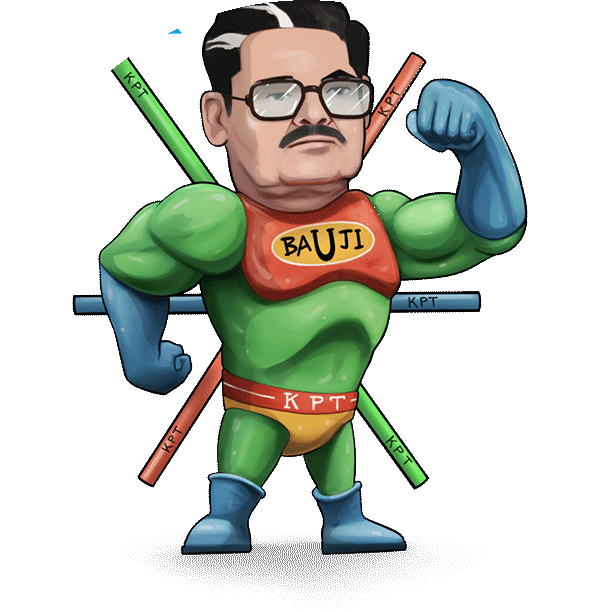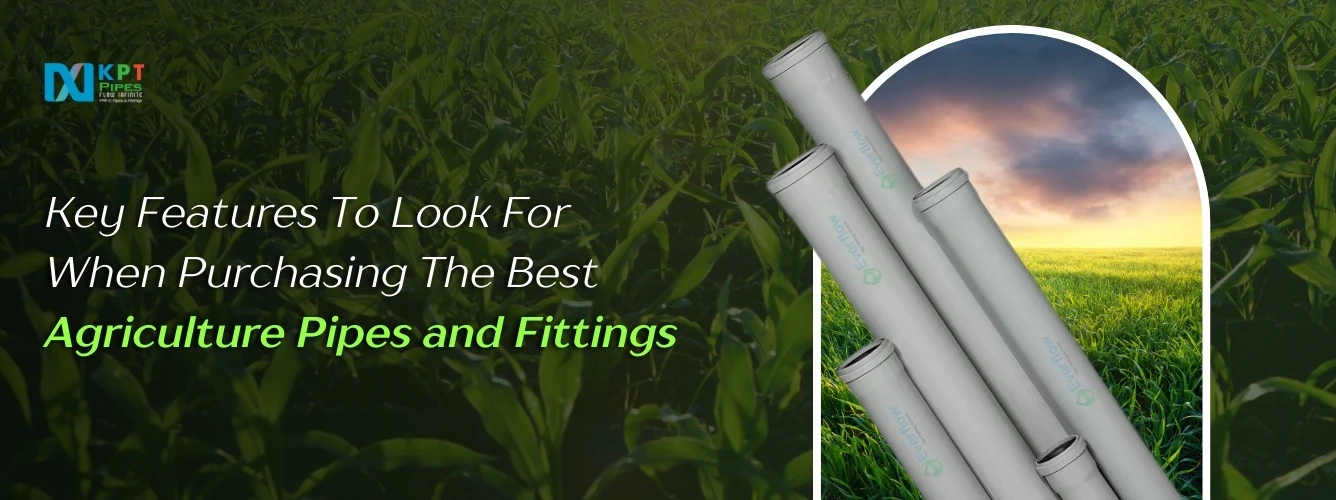Irrigation is the lifeline of every farm. Even the best fields can wither under the sun without a reliable network of pipes and fittings. Yet, finding the right agriculture pipes and fittings often becomes an overwhelming or stressful task. This stress often stems from factors like availability of countless materials, diameters of pipes, and joint types on the market. You might even wonder if these pipes could survive tractor passes? Or, can they handle fertilizers and chemicals? Even the worry about leaks under high pressure may add to this stress?
A single burst pipe can flood your crops or leave plants parched. On the other hand, hidden leaks can waste hundreds of gallons each day, driving up costs and damaging soil structure. Hence, we understand that these concerns related to irrigation pipes are not unreasonable. Everyone wants to invest in agriculture pipes and fittings that can thrive under various environmental conditions. Precision and durability are indeed non-negotiable.
But how to ensure you receive such precision and durability from your chosen irrigation pipes in farms? You can indeed ensure it by focusing on key features proven to enhance performance and longevity. This article aims to cover nine essential features to look for in your agricultural pipes. By the end, you’ll know exactly what to look for to keep your irrigation system running smoothly year after year.
Table of Contents
Toggle1. High Impact Resistance
Are you worried about heavy equipment colliding with your irrigation lines? There is a risk of damage every time a tractor or harvester passes over exposed pipes. When pipes lack impact resistance, these collisions can crack or crush the tubing, leading to sudden leaks or costly replacements. However, selecting pipes with high impact resistance keeps your system safe.
Top-quality agriculture pipes and fittings with this feature use reinforced UPVC Pipes. This material flexes under impact rather than breaking. The polymer also absorbs shocks from dropped tools and vehicle traffic without permanent deformation.
When it comes to fittings, look for molded designs with extra material at stress points. Ultimately, investing in high impact resistance means fewer interruptions and more reliable irrigation across your fields.
2. Long Operational Life
You need pipes that last multiple growing seasons, not just one. Agriculture pipes and fittings made from virgin-grade UPVC Pipes or UV-stabilised PVC can offer such long operational life. They maintain their strength and shape for 25 years or more. Unlike recycled materials that can weaken over time, pipes made of virgin-grade resins resist fatigue and environmental stress cracking.
When talking about fittings, look for those crafted with durable elastomer seals such as EPDM or nitrile. These seals are known to retain elasticity even after repeated pressure cycles. This longevity reduces the total cost of ownership by cutting replacement frequency. When your system can run year after year without major overhaul, you can focus on crop management rather than pipeline replacement.
3. Corrosion Resistance
Are you going to farm in salty plains or will be using mineral-rich well water? Such conditions can regulate the corrosion process at a faster rate in metal pipes. The corrosion will eat through metal pipes, quickly, sometimes even within the first few months. It will be highly beneficial to choose agriculture pipes and fittings made from corrosion-resistant materials like UPVC or speciality PVC. These compounds resist rust, pitting, and mineral buildup. Moreover, they maintain a smooth interior that keeps flow rates steady.
Do you want to ensure your irrigation system works for years? Then, simply focusing on corrosion-resistance pipes are not enough. You must also opt for corrosion-proof fittings. Pick the fittings that lock tight, as it would help to avoid leaks at coupling points. Choosing these materials is essential in high-salinity or acidic soils. Doing so ensures you won’t have to dig up lines every season. At the end of the day, corrosion resistant agriculture pipes and fittings will safeguard both your water quality and the productivity of your fields. This would ensure your irrigation network lasts as long as your crop rotations.
4. Chemical Resistance
Do you inject fertilizers or herbicides directly through your pipelines on your farm? This is known as “Fertigation” which is a popular method among many farmers. This process can boost the crop yield but requires the farmers to use chemically resistant piping. Chemicals like nitrates, phosphates, and glyphosate are used during fertigation. They can degrade pipes made of ordinary plastics over time.
Agriculture pipes and fittings featuring chemically inert polymers can however shrug off these compounds without any damage. Choosing the pipe made of correct polymer prevents swelling, softening, or micro-cracking that lead to leaks under pressure. Request the seller of your chosen agricultural pipes to share the compatibility charts to confirm which compounds each pipe can handle. Check the charts for compounds you will be using and ensure the pipe is compatible and resilient against those chemicals.
Knowing which chemicals a pipe can handle lets you integrate fertilization seamlessly into your workflow. Chemical resistance not only extends pipe life but also protects your crops from contamination. Choosing the pipes made from right material and compatible to your required chemicals ensure you can boost yields without worrying about pipeline failure.
5. Lightweight and Easy Handling
Planting and harvesting windows wait for no one. However, heavy metal or concrete pipes often slow down installation and even require extra labour. These can lead to delays, costing you hundreds. But choosing agriculture pipes and fittings made from lightweight PVC or UPVC material can solve this problem. Two workers can easily carry long segments of pipes made from these material through fields. Their light weight and easy handling eliminates the need for cranes or forklifts.
This portability speeds installation and even emergency repairs. If a pipeline section fails, your crew can transport replacements without specialized equipment. This is extremely crucial when time is of the essence. Lightweight materials also reduce shipping costs, especially for remote farms where transportation adds overhead. Doesn’t it seem to be a win-win situation?
Beyond handling benefits, modern lightweight pipes also maintain high pressure ratings and structural strength. You can minimize downtime, reduce labour requiring, and keep planting and harvesting schedules on track by choosing easy-to-handle irrigation components.
6. Ease of Installation
Complex fittings and need for specialized tools can stall your irrigation rollout. Would you want that? No, right? The ideal agriculture pipes and fittings can ensure you never have to deal with delays. Pipes made of materials like UPVC or PVC feature simple, reliable joining methods such as solvent welding, electrofusion, or push-fit couplings.
Solvent welding uses a liquid solvent to create a monolithic connection that cures quickly and withstands high pressures. Electrofusion fittings on the other hand incorporate a built-in heating coil that fuses pipe and fitting without adhesives, ensuring a uniform bond. Push-fit systems rely on O-ring seals and locking grips, requiring no tools and offering immediate leak-proof connections.
Either or these joining methods lead to ease of installation. Easy installations in turn reduces errors, accelerates project timelines, and cuts labour costs. Choosing a pipeline system with a streamlined assembly process would mean your irrigation network goes live faster and operates reliably from day one, maximizing the growing season.
7. High Flow Efficiency
The inner walls of the pipe holds great value. Pipes with rough or scaled interiors cause friction losses that force pumps to run longer and deliver less water to distant field sections. They may even distribute water unevenly in the field, negatively impacting the crop development. But you cannot let your irrigation system impact crop development, can you?
Agriculture pipes and fittings with highly polished, mirror-smooth internal surfaces that doesn’t happen to your crop. These piping systems maintain consistent diameters and friction coefficients. This hydraulic efficiency preserves design flow rates, ensuring each drip line and sprinkler head receives exactly the water it needs.
Efficient piping reduces energy consumption, lowering pumping costs and carbon footprint. It also prevents pressure fluctuations that can damage delicate drip emitters. With high flow efficiency, your irrigation system achieves uniform coverage, healthier crops, and optimized operational costs year after year.
8. Leak-Proof Joints
Even minor leaks can erode soil, wash away fertilizers, and create dry zones that could eventually kill plants. Choosing weaker pipes would leave you dealing with constant leaks. It would impact the cost involved in farming and even lead to lower yield. But choosing pipes with lead-proof joints offer you peace of mind. Such reliable agriculture pipes and fittings incorporate advanced joint technologies to ensure zero water loss.
Fusion-welded UPVC couplings fuse pipe and fitting into a single, continuous section, eliminating weak interfaces. Compression fittings, equipped with heavy-duty rubber gaskets and stainless-steel clamps on the other hand provide a robust, shape-memory seal that locks tight under pressure.
Leak-proof joints prevent costly soil erosion repairs, preserve moisture balance, and reduce the need for emergency maintenance during critical growth stages. Investing in superior joint technology also ensures your irrigation network performs flawlessly when you need it most.
9. UV Resistance
Exposed irrigation lines face relentless ultraviolet radiation. UV will eventually degrade unprotected plastics and make them brittle and prone to cracks. Agriculture pipes and fittings formulated with UV stabilizers on the contrary absorb and block harmful rays. These features of such piping systems help preserve their mechanical strength and flexibility.
Pipes made of UV-stabilised UPVC or UPVC materials will protect aboveground connections in orchards, vineyards, and open fields. This protection would prevent surface chalking, loss of tensile strength, and premature failure. UV resistance also ensures consistent performance throughout long growing seasons. This empowers you to avoid sudden system breakdowns that can jeopardise crop health.
Conclusion
Taking time to select top-quality agriculture pipes and fittings pays dividends through every planting season. Low-grade components may seem cheaper initially. However, they often lead to hidden costs, water waste from leaks, lost crops from uneven irrigation, and emergency repair bills that spike during peak growth.
But picking the right piping system can help ensure you don’t have to deal with such headaches and losses. You can instead build an irrigation network that performs reliably across planting, growing, and harvest cycles.
Everflow agriculture pipes and fittings from KPT Piping System Private Limited is here to help you achieve just that. Our UPVC-based pipes deliver superior durability against equipment impacts, fertilizers, and UV exposure. Fusion-welded joints and precision fittings ensure zero leaks, while smooth interiors maximize hydraulic efficiency. Thousands of farmers trust our Everflow line to keep their fields hydrated and their yields high.



